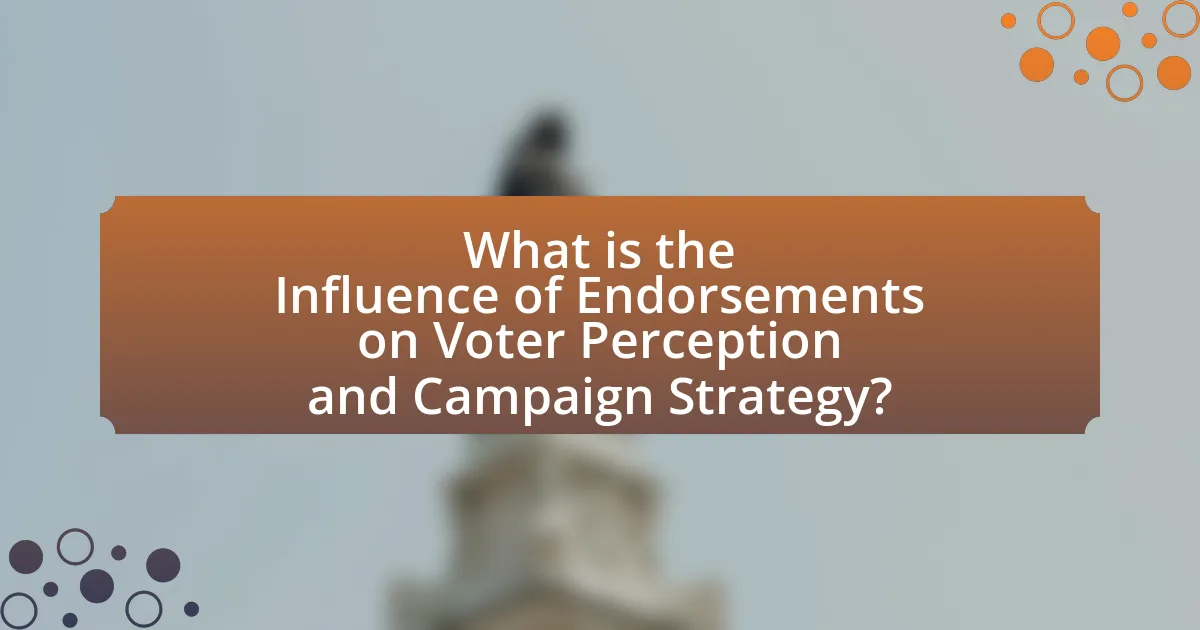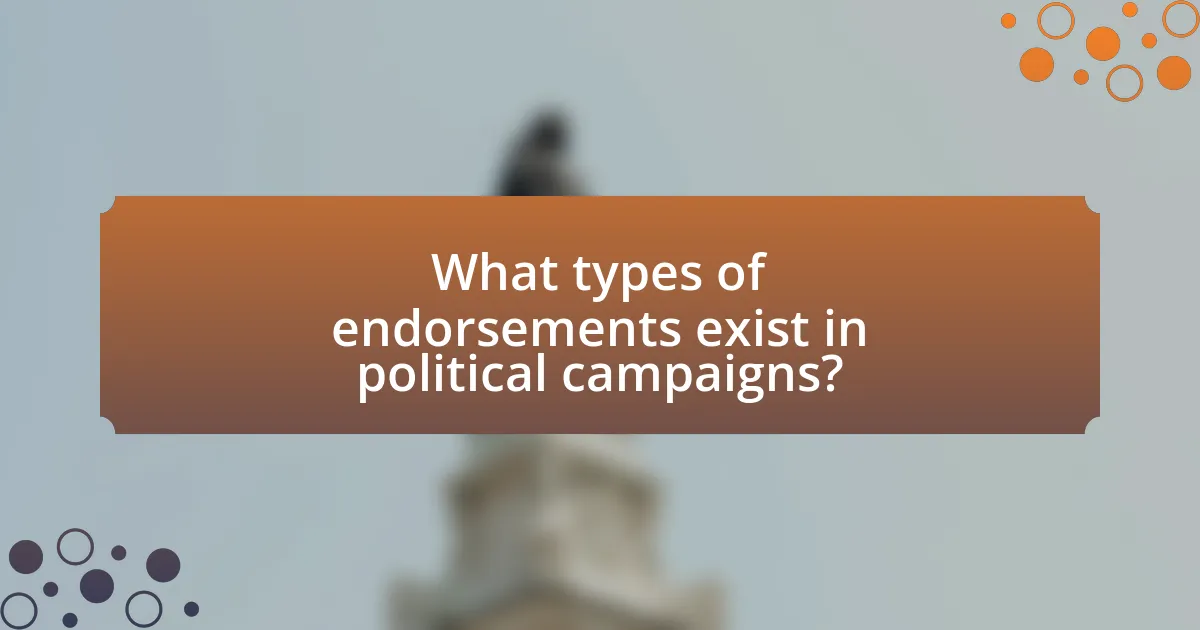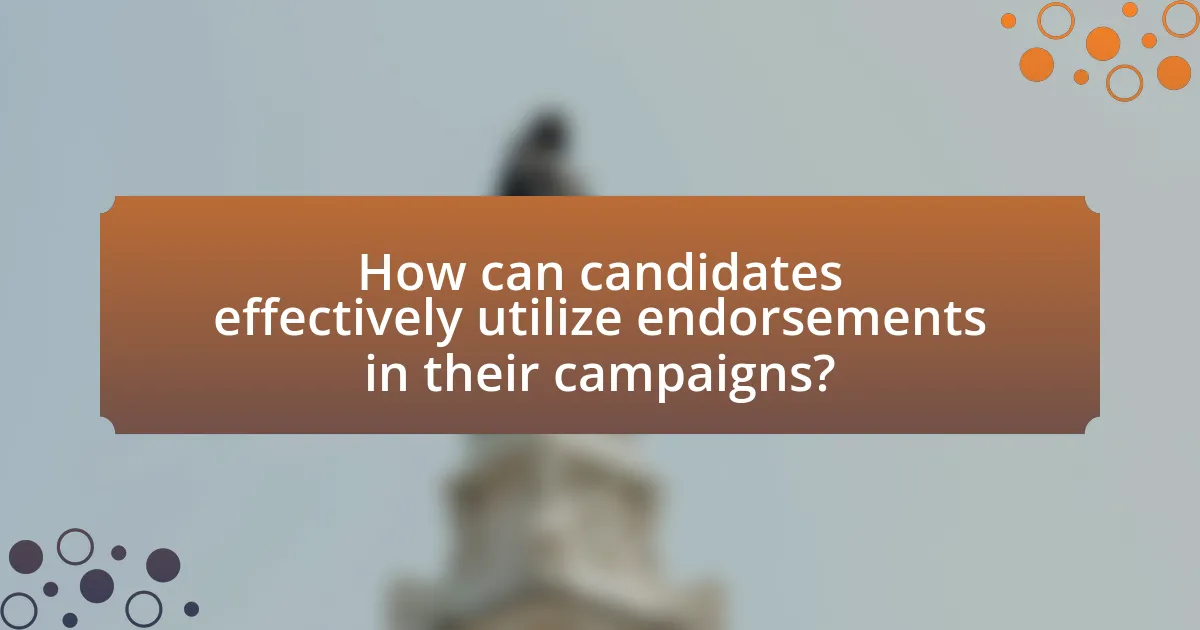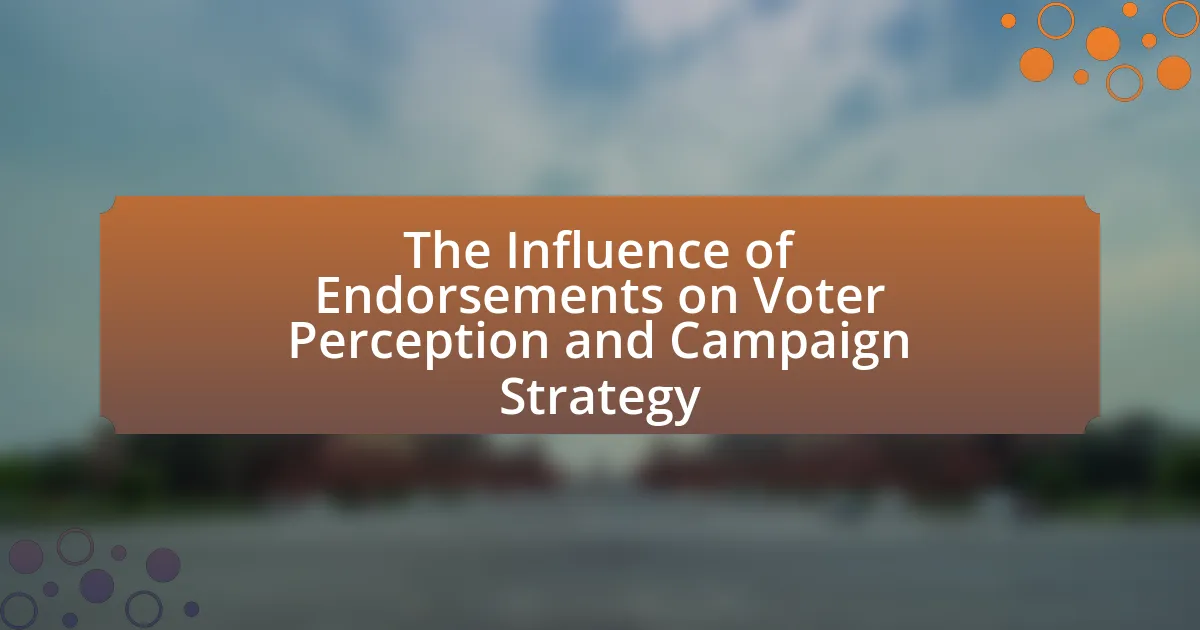The article examines the influence of endorsements on voter perception and campaign strategy, highlighting how endorsements enhance a candidate’s credibility and appeal. It discusses the psychological factors that shape voter responses to endorsements, the types of endorsements available, and their varying impacts on voter trust and campaign effectiveness. Additionally, the article outlines strategies candidates can employ to leverage endorsements, the potential risks associated with them, and best practices for ensuring alignment with campaign values. Overall, it provides a comprehensive analysis of how endorsements can significantly affect electoral outcomes and voter behavior.

What is the Influence of Endorsements on Voter Perception and Campaign Strategy?
Endorsements significantly influence voter perception and campaign strategy by enhancing a candidate’s credibility and appeal. When a respected figure or organization endorses a candidate, it can sway undecided voters and reinforce the loyalty of existing supporters. Research indicates that endorsements can lead to a measurable increase in voter support; for example, a study by the Pew Research Center found that 60% of voters consider endorsements important in their decision-making process. Additionally, campaigns often strategically seek endorsements to leverage the endorser’s influence, tailoring their messaging to align with the values and priorities of the endorsing entity, thereby optimizing their outreach efforts.
How do endorsements shape voter perceptions during elections?
Endorsements significantly shape voter perceptions during elections by enhancing the credibility and appeal of candidates. When influential figures or organizations publicly support a candidate, it can lead to increased trust and recognition among voters. For instance, a study by the Pew Research Center found that endorsements from respected political figures can sway undecided voters, as they often rely on these endorsements to guide their choices. Additionally, endorsements can create a bandwagon effect, where voters feel compelled to support a candidate who is perceived as popular or favored by others. This dynamic illustrates how endorsements not only influence individual voter decisions but also impact the overall electoral landscape.
What psychological factors influence voter responses to endorsements?
Psychological factors that influence voter responses to endorsements include social proof, authority, and cognitive dissonance. Social proof suggests that individuals are more likely to support a candidate endorsed by trusted figures or groups, as they perceive this as validation of their choice. Authority plays a role when endorsements come from respected individuals or organizations, leading voters to trust their judgment and align with their recommendations. Cognitive dissonance occurs when voters experience discomfort from conflicting beliefs; endorsements can help resolve this by reinforcing a preferred choice, making it easier for voters to justify their decisions. Research indicates that endorsements can significantly sway voter opinions, particularly when they come from credible sources, highlighting the importance of these psychological factors in electoral contexts.
How do endorsements affect voter trust and credibility in candidates?
Endorsements significantly enhance voter trust and credibility in candidates by providing social proof and validation from respected figures or organizations. When a well-known individual or a reputable group endorses a candidate, it signals to voters that the candidate is trustworthy and competent, which can lead to increased support. Research indicates that endorsements can sway undecided voters; for instance, a study by the Pew Research Center found that 60% of voters consider endorsements from local leaders as influential in their decision-making process. This demonstrates that endorsements not only bolster a candidate’s image but also play a crucial role in shaping voter perceptions and influencing electoral outcomes.
What role do endorsements play in shaping campaign strategies?
Endorsements play a crucial role in shaping campaign strategies by enhancing credibility and influencing voter perceptions. When a candidate receives endorsements from respected figures or organizations, it signals to voters that the candidate is trustworthy and has the support of influential stakeholders. For instance, a study by the Pew Research Center found that endorsements can significantly sway undecided voters, as they often rely on trusted sources to guide their decisions. Additionally, endorsements can help campaigns focus their messaging and outreach efforts, as they often align with the values and priorities of the endorsing entity, thereby attracting specific voter demographics.
How do candidates select endorsers to maximize impact?
Candidates select endorsers to maximize impact by strategically choosing individuals who possess significant influence, credibility, and alignment with their campaign values. This selection process often involves analyzing the endorser’s public image, reach within target demographics, and previous engagement in political discourse. For instance, endorsements from respected figures in a candidate’s party or community can enhance perceived legitimacy and attract undecided voters. Research indicates that endorsements can increase a candidate’s support by as much as 10% when the endorser is well-regarded and relevant to the electorate. Thus, candidates prioritize endorsers who resonate with their audience and can amplify their message effectively.
What strategies do campaigns use to leverage endorsements effectively?
Campaigns leverage endorsements effectively by strategically selecting endorsers who resonate with their target demographics and aligning the messaging to amplify credibility. For instance, campaigns often choose local leaders or influential figures within specific communities to enhance relatability and trust among voters. Research indicates that endorsements from well-respected individuals can increase a candidate’s perceived legitimacy; a study by the Pew Research Center found that 70% of voters are influenced by endorsements from trusted figures. Additionally, campaigns utilize multi-channel communication to disseminate endorsements, ensuring that the message reaches a broader audience through social media, press releases, and public events, thereby maximizing the impact of the endorsement.

What types of endorsements exist in political campaigns?
In political campaigns, there are several types of endorsements, including individual endorsements, organizational endorsements, and issue-based endorsements. Individual endorsements come from prominent figures, such as politicians, celebrities, or community leaders, who lend their personal support to a candidate. Organizational endorsements are provided by groups, such as labor unions, political parties, or advocacy organizations, which often represent collective interests and can mobilize their members to support a candidate. Issue-based endorsements focus on specific policies or causes, where organizations or individuals endorse candidates based on their positions on particular issues, such as healthcare or environmental policy. These endorsements can significantly influence voter perception and campaign strategy by enhancing a candidate’s credibility and expanding their reach to different voter demographics.
How do different types of endorsements vary in their influence?
Different types of endorsements vary in their influence based on the credibility and relatability of the endorser. For instance, endorsements from well-known public figures or celebrities can significantly sway public opinion due to their broad reach and established trust, as evidenced by a study from the American Psychological Association which found that celebrity endorsements can increase product sales by up to 20%. In contrast, endorsements from local community leaders or organizations may resonate more deeply with specific voter demographics, as they often reflect shared values and experiences, leading to a more personal connection. This localized influence can be particularly impactful in grassroots campaigns, where community trust is paramount. Thus, the effectiveness of endorsements is contingent upon the endorser’s perceived authority and the alignment with the audience’s values.
What is the impact of celebrity endorsements compared to political endorsements?
Celebrity endorsements generally have a more significant impact on consumer behavior and brand perception than political endorsements do on voter behavior. Research indicates that celebrity endorsements can enhance brand recognition and influence purchasing decisions, with a study by the Journal of Advertising showing that 20% of consumers are more likely to purchase a product endorsed by a celebrity. In contrast, political endorsements primarily serve to validate a candidate’s credibility and can sway undecided voters, but their overall impact is often less quantifiable. A study by the Pew Research Center found that while endorsements can influence voter opinions, they are less effective than personal connections and party affiliation in determining electoral outcomes. Thus, while both types of endorsements play roles in their respective domains, celebrity endorsements tend to have a more direct and measurable effect on consumer choices compared to the more nuanced influence of political endorsements on voter behavior.
How do grassroots endorsements differ from institutional endorsements?
Grassroots endorsements differ from institutional endorsements primarily in their source and impact on voter perception. Grassroots endorsements come from individuals or local organizations, reflecting community-level support and often fostering a sense of authenticity and relatability among voters. In contrast, institutional endorsements are provided by established organizations, political parties, or influential figures, which can lend credibility and authority but may also be perceived as disconnected from the average voter. Research indicates that grassroots endorsements can significantly enhance a candidate’s appeal, particularly among younger voters, as they resonate with personal experiences and local issues, while institutional endorsements may sway undecided voters through established reputations and resources.
What are the potential risks associated with endorsements?
The potential risks associated with endorsements include damage to credibility, alienation of certain voter demographics, and the possibility of backlash if the endorsed candidate fails to meet expectations. Endorsements can lead to a loss of trust if the endorser is perceived as insincere or if their values do not align with those of the endorsed candidate. For example, a prominent figure endorsing a candidate who later faces scandal can result in reputational harm for the endorser. Additionally, endorsements may polarize voters, as supporters of opposing candidates may feel disenfranchised or more motivated to oppose the endorsed candidate. This dynamic can be observed in political campaigns where endorsements from controversial figures lead to increased division among the electorate.
How can negative endorsements affect a candidate’s campaign?
Negative endorsements can significantly harm a candidate’s campaign by damaging their public image and credibility. When a prominent figure or organization publicly criticizes a candidate, it can lead to decreased voter support, as potential voters may align their opinions with the negative sentiments expressed. For instance, a study by the Pew Research Center found that negative campaigning can lead to a 10-15% drop in approval ratings for candidates targeted by such endorsements. This decline in approval can hinder fundraising efforts and reduce overall campaign momentum, ultimately impacting election outcomes.
What happens when an endorser’s reputation is called into question?
When an endorser’s reputation is called into question, it can lead to a significant decline in the effectiveness of their endorsement. This decline occurs because voters may lose trust in the endorser’s credibility, which can negatively impact the candidate or cause they are supporting. Research indicates that endorsements from reputable figures can enhance a candidate’s appeal, but if the endorser faces controversy, it can create skepticism among voters, leading to decreased support. For instance, a study by the Pew Research Center found that 70% of voters are influenced by the perceived integrity of endorsers, suggesting that any damage to an endorser’s reputation can directly affect voter perception and campaign strategy.

How can candidates effectively utilize endorsements in their campaigns?
Candidates can effectively utilize endorsements in their campaigns by strategically selecting influential figures whose support aligns with their values and target demographics. Endorsements from respected leaders or organizations can enhance a candidate’s credibility and appeal, as evidenced by studies showing that voters are more likely to support candidates endorsed by individuals they trust. For instance, a 2016 study by the Pew Research Center found that 70% of voters consider endorsements from local leaders important in their decision-making process. By leveraging these endorsements in campaign messaging and outreach efforts, candidates can significantly increase their visibility and voter engagement.
What best practices should candidates follow when seeking endorsements?
Candidates should prioritize building genuine relationships with potential endorsers to effectively seek endorsements. Establishing trust and demonstrating shared values can significantly enhance the likelihood of receiving support. Research indicates that endorsements from credible figures can increase a candidate’s perceived legitimacy and appeal, as seen in the 2016 U.S. presidential election where endorsements from influential leaders played a crucial role in shaping voter perceptions. Additionally, candidates should tailor their outreach to align with the interests and priorities of the endorsers, ensuring that the endorsement feels authentic and mutually beneficial.
How can candidates build relationships with potential endorsers?
Candidates can build relationships with potential endorsers by engaging in consistent and meaningful communication. Establishing trust through regular interactions, such as meetings or networking events, allows candidates to demonstrate their values and vision, which can resonate with potential endorsers. Additionally, candidates should actively listen to the concerns and priorities of endorsers, tailoring their messages to align with those interests. Research indicates that endorsements can significantly influence voter perception, as seen in the 2020 U.S. presidential election, where endorsements from influential figures swayed undecided voters. By fostering genuine connections and aligning their campaign goals with the interests of potential endorsers, candidates can enhance their chances of securing valuable endorsements.
What strategies can candidates employ to announce endorsements effectively?
Candidates can announce endorsements effectively by utilizing social media platforms, hosting press conferences, and leveraging email newsletters. Social media allows candidates to reach a broad audience quickly, engaging supporters through posts, videos, and live streams that highlight the endorsement’s significance. Press conferences provide a formal setting to convey the endorsement’s importance, allowing candidates to articulate their vision and values in alignment with the endorser. Email newsletters can be used to directly communicate with supporters, providing detailed information about the endorsement and its implications for the campaign. Research indicates that endorsements can significantly influence voter perception, as seen in a study by the Pew Research Center, which found that 70% of voters consider endorsements when making their decisions.
What common pitfalls should candidates avoid regarding endorsements?
Candidates should avoid the pitfall of seeking endorsements from individuals or organizations that do not align with their values or campaign message. Misaligned endorsements can confuse voters and dilute a candidate’s brand, leading to decreased trust and support. For instance, a candidate advocating for environmental policies may face backlash if endorsed by a corporation known for environmental violations, as this contradiction can alienate their core voter base. Additionally, candidates should be cautious of over-relying on endorsements, as excessive focus on them can detract from their own message and authenticity, making it appear that they lack independent support.
How can candidates ensure endorsements align with their campaign values?
Candidates can ensure endorsements align with their campaign values by conducting thorough research on potential endorsers to confirm their values and public stances match the campaign’s principles. This alignment can be assessed through reviewing the endorser’s past actions, public statements, and overall reputation within the community. For instance, a candidate focused on environmental issues should seek endorsements from organizations or individuals known for their commitment to sustainability. By strategically selecting endorsers who resonate with their core message, candidates can enhance their credibility and strengthen voter trust, as evidenced by studies showing that endorsements from aligned figures can significantly influence voter perceptions and increase campaign effectiveness.
What should candidates do if an endorsement backfires?
Candidates should promptly distance themselves from the endorsement that backfired. This involves publicly disavowing the endorsement and clarifying their stance to mitigate any negative impact on their campaign. For instance, in 2016, several candidates faced backlash from controversial endorsements and successfully navigated the situation by issuing statements that emphasized their independent values and beliefs, thereby regaining voter trust.
